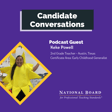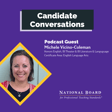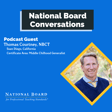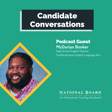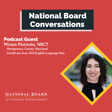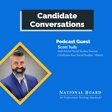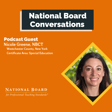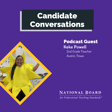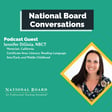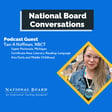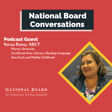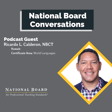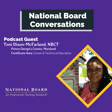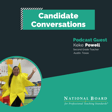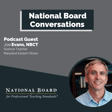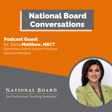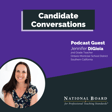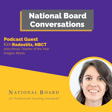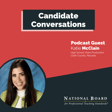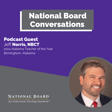Become a Creator today!Start creating today - Share your story with the world!
Start for free
00:00:00
00:00:01

Jada Reeves
Jada Reeves, NBCT joins National Board Conversations to discuss the ins and outs of Component Two in the National Board process. Be sure to follow us on all our social media platforms to keep up with all National Board-related updates.
Twitter: @NBPTS
Instagram: @NBPTS
Facebook: The National Board for Professional Teaching Standards
Transcript
Introduction to Jada Reeves
00:00:00
Speaker
Welcome back to National Board Conversations. In this episode, we talk to Jada Reeves about Component 2. She's a National Board Certified Teacher in West Virginia and has the tips and tricks to help you deal with the process. I'm going to hold you much longer. Here's my breakdown of Component 2 with Jada Reeves.
Jada's Career Path and Burnout Experience
00:00:14
Speaker
Welcome to the show, Jada. Thank you for taking the time to talk to me. Oh, you're welcome. I'm excited to help with anything with National Board.
00:00:21
Speaker
All right, so we're going to take a deep dive into component two, but we're going to get to, we're going to get an intro of you first. So what's your current role and can you give a brief introduction of how you got there?
00:00:30
Speaker
Yes, I am currently an academic coach for my district, and I mainly teach with students and teachers in grades K through five. I love my school. It's really, really great. My role as an academic coach is to help and assist other teachers for a student-centered learning environment through student-centered coaching.
00:00:55
Speaker
I got this position a couple years ago. I had been in a classroom for several years. I was also a Title I teacher. And I feel like my calling as a professional is to help mentor and help other people through collaboration and being encouraging. I like it. I like it. So National Board is usually about collaboration. Why did you pursue board certification?
00:01:24
Speaker
Well, with my own story, I did not want to be a teacher anymore. And this was before the pandemic. I was burnt out. I was exhausted. It was just a really hard time.
00:01:41
Speaker
I think it was either a year eight or nine for me. And I just remember, you know, I was in this classroom and I was like, I can't do this anymore. Something has to change. And I knew that there was a national board mentor in my building. And I just, as soon as I was done in that class, I went straight to her office and I said, I'm ready. I've got to do something different.
00:01:59
Speaker
um and by pursuing this I knew I always wanted to do it but it seemed like life got in the way and you know I had children and you know just wasn't ever ready for it but that was the moment I was and um totally transformed my teaching I remember that I um got my passion back I love love teaching even through the pandemic it's tough but um
00:02:25
Speaker
You know i'm here and i'm doing it, I got certified in early middle childhood literacy and that's my expertise and i've i've went a lot of places and had a lot of opportunities by becoming national board certified.
Overcoming Personal Challenges for Board Certification
00:02:39
Speaker
So what was your journey like did you have any stumbles along the way. um while I was getting my certification. yeah.
00:02:46
Speaker
Okay. I guess the main thing because, you know, I said life gets in the way life happens and I deal with this with the candidates that I mentor through the process. My grandmother was very sick during that time. She had Alzheimer's and I was staying the nights with her at hospice. She was moved to hospice and I was at one of my meetings and I had literally just left hospice and they said, you need to come back.
00:03:16
Speaker
Um, so I left and she did pass away in the middle of my journey, but she was a teacher. She was a first grade teacher for years. And I knew that she would not want me to give up because she was feisty and she was not one of those people that let anything go. So, you know, I took a week off because it was December. It was really, it was, I think it was December 15th or 16th. Um, and after Christmas, I started right back up.
00:03:43
Speaker
Um, I did all four components in one year and I did certify, but in the back of my mind, you know, as a single mom, I had two toddlers taking care of, um, my family. So I did have a lot of, uh, stumbling blocks, but I wasn't going to let anything get in my way because once I decided to do something, I'm not stopping.
00:04:04
Speaker
That's amazing. And now you're here with your National Board Certified Teacher. Congratulations. I'm actually doing my MOC this year. Oh, good luck. Good luck. Yes.
Exploring Component 2: Differentiated Instruction
00:04:14
Speaker
So we got to jump into component two now. So can you give us an overview of what component two is?
00:04:19
Speaker
Yes, component two is basically differentiated instruction and just being able to realize what your students' needs are and how to help them because we know as educators, not all of the students come to us ready to learn at the same time.
00:04:41
Speaker
I always think of that analogy about popcorn and they all go into the same pot at the same time, but they all pop when they're ready. And that's kind of how component two is designing your instruction to meet the needs of different students. And it's going to be very different. You're still teaching the same content. You just have to teach it in a different way to help those students in their learning modalities.
00:05:09
Speaker
So what are some considerations educators should keep in mind when preparing for component two? Well, if you are not differentiating instruction, that is the first place to start. Believe it or not, I work with a lot of educators coming to this process and they go through my cohort and they're not used to doing that. And it always, you know, I think that that's the common ground, but it isn't.
00:05:37
Speaker
So tell me prepared and hold on. Can you stop that? I forgot where I was at.
00:05:53
Speaker
We're talking about differentiated instruction. OK, so coming to the national board process and being open minded and knowing that you are a learner through the process is the main key because this is what makes you as an accomplished teacher is going through this process. And if you're not doing it, it forces you to. So differentiated instruction, just knowing where your students are at
00:06:20
Speaker
And it's not always about observation. So some of my advice and tips to other teachers is you do formative assessments all the time, but it kind of say to kind of teaches you how to use those assessments.
00:06:37
Speaker
to target the students that you have and pinpoint that skill area that's a deficit or where they need to learn so you can start where they're ready and then build up on that. So do you have any resources that you would suggest for educators when they take on this component?
Resource Recommendations for Component 2
00:07:00
Speaker
Well, I have a lot of resources. I compile a lot of things myself to share with my mentor or with my mentors that helped me, but my mentees. Samford University has a Canvas course and I think it's listed on the National Board site where they can enroll. I always say that's very helpful because nothing is going to hurt you. As long as you're learning and gathering all this knowledge, it's not going to be bad.
00:07:29
Speaker
and you're an accomplished teacher, so you're a lifelong learner as well. It kind of goes along with those core propositions that National Board has. Another resource that I like to share with other people is using student-centered learning. I think the book is, I don't know if it's by Mary Ellen Wiemer, but it kind of helps
00:07:52
Speaker
teachers realize that not only with differentiated instruction, are you planning your lessons, but getting the students involved in their learning and monitoring their own progress, basically getting resources to help you have a student-centered classroom environment. Last one, do you have any strategies or advice for educators working on components?
Strategies for Certification Success
00:08:20
Speaker
Okay, strategies and advice. Take it one day at a time, because a lot of times you're not used to doing this type of, I guess, work. A lot of times teachers are so used to making these decisions and it's in their head, but putting that evidence down onto paper and learning how to analyze it and analyze the why of what you're doing,
00:08:46
Speaker
would be one advice, just putting it down, you know, use a post-it, carry a clipboard around, and if you make a decision like, okay, why did I just tell that student to do that? Why did I grab a highlighter? Just those little things. It does take a little time, most of the time, depending on the certifications, it's going to last over at least three weeks.
00:09:11
Speaker
So, you know, pacing yourself, creating timelines is always helpful. I like to make checklists because I like to check off when I'm done with things. It makes me feel accomplished. So using those national board resources in the commentary components are very helpful. A lot of times I'll create a checklist for our cohort to kind of go along with
00:09:36
Speaker
whatever they're doing at the time, but basically pacing yourself. Um, I know several, um, people that have went through the process, they like to work on everything at the same time. My advice because I don't work that way is I focus on one at a time. And once you're focused, um, on one component, it's a little bit easier to get that finished instead of your mind going in all different directions.
00:10:02
Speaker
All right, so we're going to take these next few questions outside of the classroom to get you know a little bit so first one I got for you is what was your first job
Jada's Early Work Experience and Book Recommendation
00:10:09
Speaker
growing up. Okay, my first job, I was a cashier Kroger. Oh man.
00:10:16
Speaker
Yeah. Um, I always wanted to have a job and, um, my mom, I was, wouldn't let me, she was, um, you know, we were in sports and we were always very busy. And I remember one of the things that they said is that you're going to work for the rest of your life. You need to enjoy your childhood. Um, but as soon as I was ready to make some money, there I was opening up Kroger, a new store. Um, and at the same time I was volunteering at a hospital. So I kind of did those two at the same thing at the same time.
00:10:44
Speaker
Nice. And last one, if you had to keep just three apps on your phone, which ones would they be? You get to keep messaging and your camera and the internet. Oh, three apps. And that's it.
00:10:54
Speaker
Okay. Three apps. I'm trying to think of the ones that I use the most. I can still use messages in my camera. Um, I guess not one of my social media apps because I learn a lot about other teachers, um, recipes. Cause I like to cook, um, exercising to like one of at least one of my social media apps. I would not be able to live without. Um, you're going to die on this one. Am I allowed to keep my calendar? Yeah, for sure.
00:11:24
Speaker
I could not live without my calendar and I did something on my phone the other day and it deleted and I texted my husband. I said, oh my gosh, I deleted everything off of my calendar. It's all gone. I was like, how am I going to keep up with my life? Um, because everybody in my family is a different color. Um, so my daughter's in dance and all of her things. My son is a wrestler football player. Um, my husband's a coach. He's also a teacher.
00:11:53
Speaker
My mom lives close to me. I have two dogs and four cats. So everybody has a different color and I would have to keep that out. And I'm actually just gonna look down at my phone because I'm trying to, oh, okay. My other one is my Kindle because I read a lot and I would not be able to survive if I didn't, if I wasn't able to read any books. So you got a book recommendation?
00:12:21
Speaker
Oh, I read a hundred last year. So yes, I read a lot. I guess one of my favorite books that I have just finished. Let me tell you the name of it. It's been my favorite this year. And it's really, really short. It is called,
00:12:43
Speaker
um the deep by River Solomon and it's a little bit about how um when the slaves came over from Africa and some of the bodies were thrown over sea and it talks about this creature and of course it's fiction about how he remembers all the memories of what those people went through and it is heart wrenching
00:13:09
Speaker
Um, it is, but it's called the deep by river Solomon. And if you want a touching book, I mean, I can't, I still can't get it out of my head. It was the first book of my, of the year. And it's still been my favorite out of the 15 that I've read so far this year. Hey, 15 books this year. Yes.
00:13:31
Speaker
to try to get through my first. Well, thank you for taking the time to talk to me. This was a lot of fun, and I got a book recommendation to go get now. You said the Deep Bibles. Rivers Solomon. Rivers Solomon. All right. That sounds like a really interesting book, so it's definitely on my list now. All right. Well, I hope you enjoy it. And anybody listening, I hope they enjoy it too. Well, thanks, Jada, for taking the time. We'll definitely have to do this again.
00:14:01
Speaker
All right, thank you.
Podcast Conclusion and Social Media Encouragement
00:14:04
Speaker
Reminder, the tips talked about on this episode of National Board Conversations are not official National Board content and are not guaranteed to help with achievement. They are best practices provided by National Board Certified Teachers to help kids going through the process. Thank you. What a useful conversation. I hope that was able to answer any question that you may have. I just want to thanks again to Jada for joining the podcast and thank you for taking the time to listen. Be sure to follow us on social media for all your National Board related updates and we'll see you next time.
